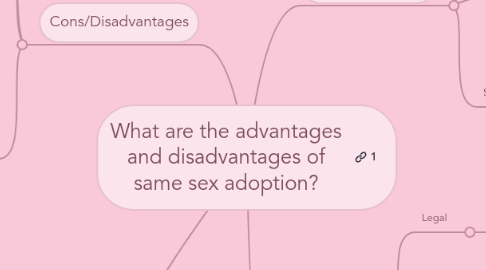
1. Cons/Disadvantages
1.1. Child's drawbacks
1.1.1. Unnatural upbringing
1.1.1.1. Distorted view of a minority sexuality
1.1.1.1.1. Example: A girl brought up by two men would fail to benefit from a feminine influence; and vice versa for boy
1.1.1.1.2. Children need role models of both sexes
1.1.2. Placing a child too young to have an opinion of their own in the care of a gay couple exposes them to prejudice
1.2. Parent's drawbacks
1.2.1. Can't provide opposite sex "role modeling"
1.2.2. Often face various kinds of discrimination; their child could face similar issues
1.3. Society's drawbacks
1.3.1. Homophobia
1.3.1.1. A range of negative attitudes and feelings towards homosexuality and people who are identified as or perceived as being homosexual
1.3.1.2. Define: unreasoning fear of or antipathy toward homosexuals and homosexuality
1.3.2. Prejudice/Discrimination
1.3.2.1. Referring to refer to preconceived judgments toward people or a person because of sexual orientation
1.3.2.2. Beliefs without knowledge of the facts and may include "any unreasonable attitude that is unusually resistant to rational influence."
1.3.2.3. Define: an unfavorable opinion or feeling formed beforehand or without knowledge, thought, or reason
1.3.3. Stereotype
1.3.3.1. People identify themselves and others with different groups, which gives them the satisfaction of being safe and belonging
1.3.3.2. Gays/Lesbians adopted child may be stereotyped as "gay/Lesbian" because of their parents
1.3.3.3. Child could be "labeled"
1.3.3.3.1. Made fun of, teased, bullied, etc.
1.3.3.4. Bias
2. Concerns
2.1. Child
2.1.1. Psychological and physical welfare (prejudice)
2.2. Religion
2.2.1. Traditional Christian values
2.2.1.1. 'Honour thy father and mother'; invokes the Fifth Commandment
2.3. Arguements
2.3.1. Argues more likely to become gay themselves
2.3.2. Argues more stable than heterosexual homes
3. Pros/Advantages
3.1. Child's benefits
3.1.1. Additional inheritance rights and child-support rights
3.1.2. Could receive survivor benefits from social security if the new parent dies
3.1.3. Eligible for health care benefits of the new legal parent, depending on the health insurance policy
3.2. Parent's benefits
3.2.1. Start a family of own
3.2.2. Provide a family unit for an orphaned or disadvantaged child
3.3. Society's benefits
3.3.1. Increases the pool of couples who are able to adopt
3.3.1.1. Move more children out of the child welfare system into a stable family
3.3.1.2. Reduces the financial burden to taxpayers
3.3.2. powerful resource for children in need of adoption
3.3.2.1. Better for child than foster care
4. The Law
4.1. Legal
4.1.1. Countries
4.1.1.1. Guam, , Andorra, Belgium, Iceland, the Netherlands, Norway, Sweden, South Africa, Spain, the United Kingdom
4.1.1.2. Some parts of Australia, Canada, and the United States
4.1.1.2.1. U.S.
4.2. Illegal
4.2.1. Countries
4.2.1.1. Italy, Latvia, and Portugal
4.2.1.2. U.S.
4.2.1.2.1. States: Colorado, Nebraska, and Wisconsin
4.3. Undecided
4.3.1. U.S. States
4.3.1.1. Arizona, Arkansas, Florida, Idaho, Kansas, Kentucky, Maine, Mississippi, Missouri, Nebraska, New Hampshire, North Carolina, North Dakota, Oklahoma, South Carolina, South Dakota, Tennessee, Utah, Virginia, West Virginia, Wyoming; no specific laws or court decisions
